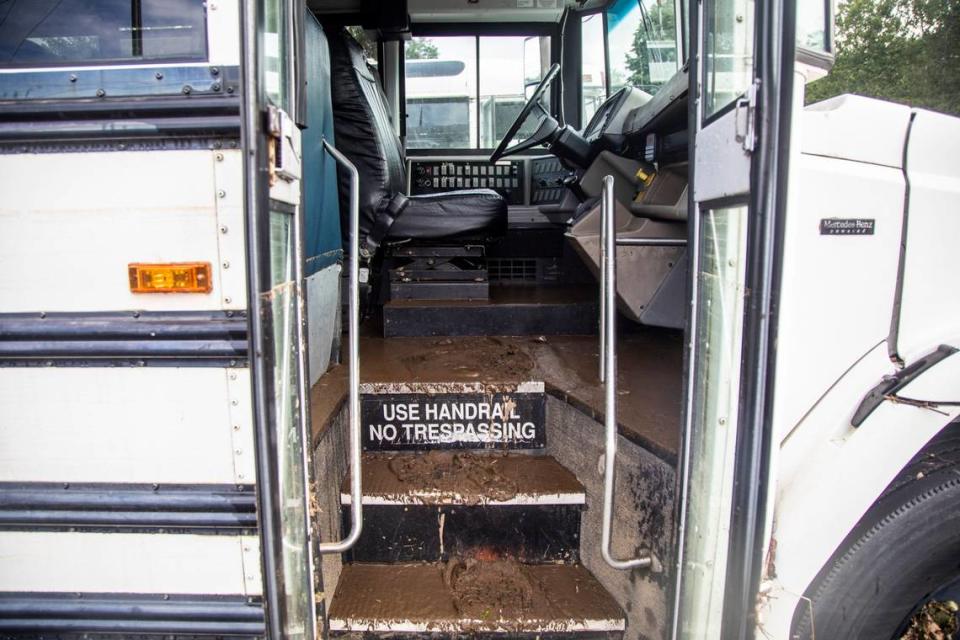Hurricane Ian could hit NC later this week. Here’s how to prepare for the storm.
Hurricane Ian is expected to give North Carolinians a soaking.
Meteorologists said Monday the storm could dump as much as 5 inches of rain on the North Carolina coast between Friday and Sunday, with early predictions showing the Triangle getting closer to 2 to 3 inches, The Herald Sun previously reported.
“In North Carolina, flooding is the big concern. It’s flooding that does the most damage, usually not high winds,” said Keith Acree, communications director for NC Emergency Management. “In Ian’s case, it looks like it’ll be more a rain and flood event than a wind event.”
Hurricane season runs from June 1 to Nov. 30. The Atlantic and Gulf of Mexico saw 21 named storms and tropical disturbances in 2021, according to the NC State Climate Office, and there have already been nine this year.
“People sometimes focus on the category of the storm and say ‘Well it won’t be that bad by the time it gets to me,’” Acree said. “But you can still get a lot of rain, and flooding can be inevitable with a large amount of rainfall.”

How to prepare for Hurricane Ian in North Carolina
Here are some last-minute things you can do to prepare for Hurricane Ian, Acree said:
• Watch the forecast: Make sure you’re following a reputable source. Ideally, you should turn on alerts for two sources, such as The Weather Channel and your local news station, he said.
Here are some trusted sources of information during weather events, The N&O previously reported:
North Carolina Department of Public Safety (NCDPS) — ncdps.gov; @NCPublicSafety on Twitter and Facebook
North Carolina Emergency Management (NCEM) — ncdps.gov/ncem; @NCEmergency on Twitter and Facebook
NC Flood Inundation Mapping and Alert Network (FIMAN) — fiman.nc.gov
North Carolina Department of Transportation (NCDOT) — drivenc.gov; @NCDOT on Twitter and Facebook
North Carolina State Highway Patrol (NCSHP) — ncdps.gov/shp; @NCSHP on Twitter; @NCHighwayPatrol on Facebook
North Carolina 2-1-1 — nc211.org; @NC_211 on Twitter; @NC211 on Facebook
Federal Emergency Management Agency (FEMA) — fema.gov; ready.gov; @femaregion4 on Twitter
National Hurricane Center — hurricanes.gov; @NHC_Atlantic on Twitter; @NWSNHC on Facebook
National Weather Service — weather.gov; @NWS on Twitter and Facebook
• Turn on emergency alerts: Go into your cell phone settings and get emergency alert notifications turned on, Acree said.
• Make an emergency plan: And make sure everyone in your household has it down.
“If you did have to take any action for an evacuation, where would you go?” Acree said. “Make a plan, primarily to stay with friends or family, or at a hotel. NC Shelters should be a last resort, that way they’re available for those who need them most.”
If you’re in a last-resort situation, find an NC Shelter by visiting readync.gov/stay-informed/open-shelters.
• Have basic supplies: And have enough to last the household a few days, he said.
Find a comprehensive list of emergency kit supplies at newsobserver.com/news.
Ideally, you should have a full emergency kit ready to go at all times (and especially during hurricane season). If you can only pack a few basics, Acree said, follow this list:
Water (one gallon per person per day)
Non-perishable food and, if needed, a can opener
Necessary medication
A light source (e.g. a flashlight) and extra batteries
Cash
Details for your insurance policy
A full tank of gas in your car
A phone charger
Include in your emergency supply kit a battery powered radio & flashlights. Make sure you have extra cash on hand & fill up your car or gas can. Have enough non-perishable food, water & medicine to last each family member for at least one week. Is your family #ReadyNC? #ncwx pic.twitter.com/lAxM0y7Knz
— NC Emergency Management (@NCEmergency) May 11, 2021
• Know your zone: And see if you’re at risk of flooding. Search your address in the NC Flood Risk Information System: fris.nc.gov
Coastal residents can use Know Your Zone, a newer initiative that teaches about predetermined evacuation zones for flooding events: ncdps.gov
• Tie down outdoor materials: Bring what you can inside. If you’re worried about trees falling, you still have time to trim them yourself or call a contractor a couple of days before a storm hits, he said.
“The one thing it is too late to do now is buy flood insurance,” Acree said about Ian. “There’s a 30-day waiting period for that, so you can’t do it when a storm is on the horizon. But you can certainly prepare the yard and get an emergency kit together, even have a contractor come and do some home preparation.”
North Carolina hurricane resources
Here are some resources to check out when preparing for a hurricane:
• Ready NC created a North Carolina Hurricane Guide, which is available in both English (readync.gov) and Spanish (readync.gov).
• The Centers for Disease Control and Prevention has safety information on hurricanes (cdc.gov/disasters/hurricanes) and flooding events (cdc.gov/disasters/floods).
• The Carolina Center for Public Service has an online list of disaster relief and recovery resources: ccps.unc.edu/disaster-relief

 Yahoo Movies
Yahoo Movies 
